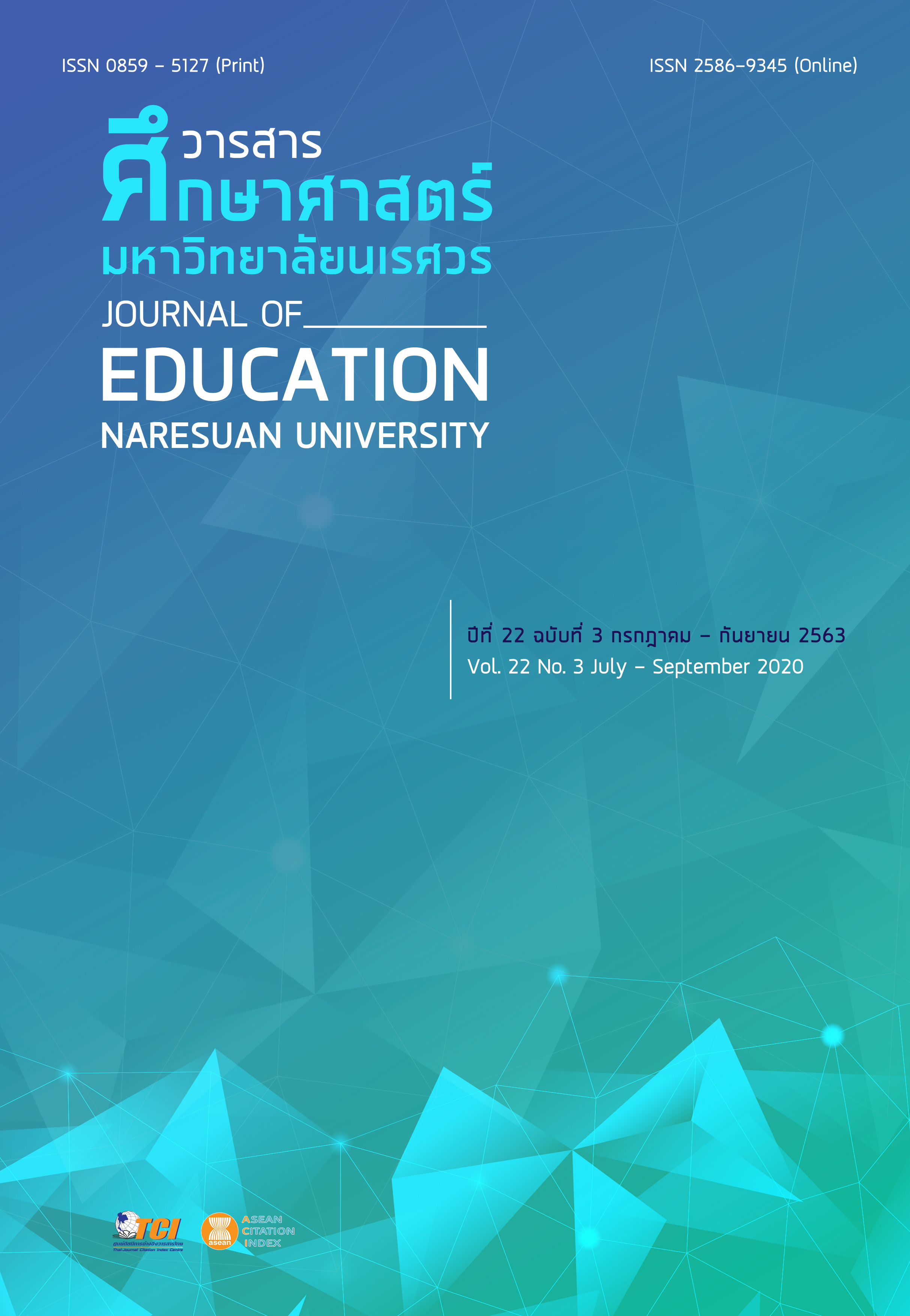AN ACTION RESEARCH FOR ENHANCING SCIENTIFIC LITERACY BY USING PROBLEM-BASED LEARNING ON STOICHIOMETRY FOR GRADE 10TH STUDENTS การวิจัยเชิงปฏิบัติการเพื่อพัฒนาการรู้วิทยาศาสตร์โดยการจัดการเรียนรู้แบบใช้ปัญหาเป็นฐาน เรื่อง ปริมาณสารสัมพันธ์ สำหรับนักเรียนชั้นมัธยมศึกษาปีที่ 4
Main Article Content
Abstract
The purpose of this research was to examine the effective ways of problem-based learning that enhance scientific literacy in stoichiometry topic of 10th grade students. The participants were 30 students. The methodology of this research was a classroom action research, run for three continuous cycles. The research instruments were classroom observation forms, researcher’s daily field notes, student reflection journals and student activity sheets. The data was analyzed using content analysis from classroom observation forms, researcher’s daily field notes and student reflection journals, analyze the result of scientific literacy using student activity sheets. Data creditability by triangulation method. The results of the study; suggest that the effective way of problem-based learning are described as follows: 1) phase of divide into groups, students divide groups by themselves, 2) phase of understand the problem, teacher brings the interesting problems in daily life encourage students to analyze and identify the problems, 3) phase of brainstorming, students choose problem issues by themselves, 4) phase of research, students find the answer by experiment, and 5) phase of summarize problem issues, students explain result of experiment and summarize the ways to solve problem and the students have progresses in term of scientific literacy.
Article Details
The owner of the article does not copy or violate any of its copyright. If any copyright infringement occurs or prosecution, in any case, the Editorial Board is not involved in all the rights to the owner of the article to be performed.
References
Alrahlah, A. (2016). How effective the problem-based learning (PBL) in dental education. A critical review. The Saudi dental journal, 28(4), 155–161. https://doi.org/10.1016/j.sdentj.2016.08.003
Apiwongngam, N. (2011). A study on science learning achievement and scientific mind through context-based learning and inquiry process of matthayomsuksa 3 students (Master thesis). Bangkok: Srinakharinwirot University). [in Thai]
Barrows, H. S., & Kelson, A. (1993). Problem-based learning in secondary education and the Problem-based Learning Institute (Monograph). Springfield: Southern Illinois University School of Medicine.
Bureau of Academic Affairs and Educational Standards. (2012). Scientific literacy. Bangkok: Office of the Basic Education Commission. [in Thai]
Jukkaew, P. (2016). An action research on developing grade XI students’ scientific inquiry process evaluating and design competency using context-based learning in learning the topic of “rate of reaction” (Master thesis). Phitsanulok: Naresuan University. [in Thai]
Kemmis, S., & McTaggart, R. (1988). The action research reader (3rd ed.). Victoria: Deakin University Press.
Klainin, S., Detsri, P., & Pramojanee, A. (2008). Knowledge and scientific competency for tomorrow’s world: PISA 2006. Bangkok: Seven printing group Publisher. [in Thai]
Katkarn, P., Srisanyong, S., & Singlop, S. (2017). The effects of problem-based learning for developing science learning achievement, problem solving abilities and scientific attitude of prathom suksa 6 students. Journal of Education, 19(1), 77 - 89. [in Thai]
Kijkuakul, S. (2014). Learning management direction for teacher in 21st century. Phetchabun: Chuladit printing. [in Thai]
Kruatong, T. (2009). Learning science in Context. IPST Magazine, 38(166), 56 – 59. [in Thai]
Noppakesorn, T. (2006). Qualitative research methodology 2. (2nd ed.). Nakhon Ratchasima: Chok – Charean Marketing. [in Thai]
Nutchom, N. (2013). A development of learning activities using contextual learning integrated with socio-scientific issues approach to enhance competency in using scientific evidence on environmental management for mathayomsuksa 3 students (Master thesis). Phitsanulok: Naresuan University. [in Thai]
OECD. (2013). PISA 2015 draft science framework. Retrieved September 26, 2017, from http://www.oecd.org/
Oluwatelure, T.A. (2010). Classroom learning environments as a correlate of scientific literacy. Journal of College Teaching and Learning, 7(6), 1-10.
Sairahung, P. (2015). The effects of the science project-based learning management to enhance scientific competencies in electric circuit for matthayomsuksa 3 students. (Master thesis, Naresuan University). (in Thai)
Tammaprathep, J. (2014). Scientific literacy. Nonthaburi: Sukhothai Thammathirat University Publisher. [in Thai]
The Institute for the Promotion of Teaching Science and Technology. (2012). The science study in Thailand : The development and the recession. Bangkok: Advance printing Publisher. [in Thai]
The Institute for the Promotion of Teaching Science and Technology. (2017). Focus issues from PISA. Retrieved July 26, 2018, from https://pisathailand.ipst.ac.th/issue-2017-17/. [in Thai]
The Institute for the Promotion of Teaching Science and Technology. (2018). Summary information of PISA 2015. Bangkok: Aroonprinting Publisher. [in Thai]


